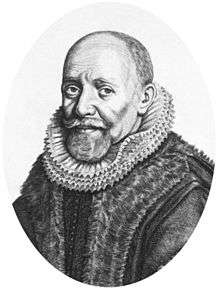Otto Heurnius
| Otto Heurnius | |
|---|---|
 Otto Heurnius (1577–1652) | |
| Born |
8 September 1577 Utrecht |
| Died |
14 July 1652 (aged 74) Leiden, Dutch Republic |
| Doctoral advisor |
J. Heurnius Pierre Du Moulin |
| Doctoral students |
Henricus Regius Johannes Walaeus |
| Other notable students | Franciscus Sylvius |
Otto Heurnius (Otto van Heurn) (8 September 1577 – 14 July 1652) was a Dutch physician, theologian and philosopher.
Life
He succeeded his father Johannes Heurnius as professor of medicine at the University of Leiden; and took over anatomy teaching from Pieter Pauw from 1617. Alongside his practical anatomy teaching, he had the care of a very various collection of zoological and botanical specimens.[1] The aims of the collection included reconstruction of the life of the Israelites in Egypt, as in the Book of Exodus.[2]
He was also a historian of philosophy, stressing the period before the philosophers of the Ancient Greeks (“barbarian philosophy”).[3] He based his ideas on the Corpus Hermeticum.[4]
References
- ↑ Cornelis W. Schoneveld, Sea-changes: studies in three centuries of Anglo-Dutch cultural transmission (1996), pp. 9–10.
- ↑ Klaas van Berkel and Arie Johan Vanderjagt, The Book of Nature in Early Modern and Modern History (2006), p. 51.
- ↑ Francesco Bottin, Models of the History of Philosophy: From its origins in the Renaissance to the "historia philosophica" (1993), pp. 106–7
- ↑ Wiep van Bunge et al. (editors), The Dictionary of Seventeenth and Eighteenth-Century Dutch Philosophers (2003), Thoemmes Press (two volumes), article Heurnius, Otto, p. 430–2.
External links
This article is issued from Wikipedia - version of the 11/6/2016. The text is available under the Creative Commons Attribution/Share Alike but additional terms may apply for the media files.